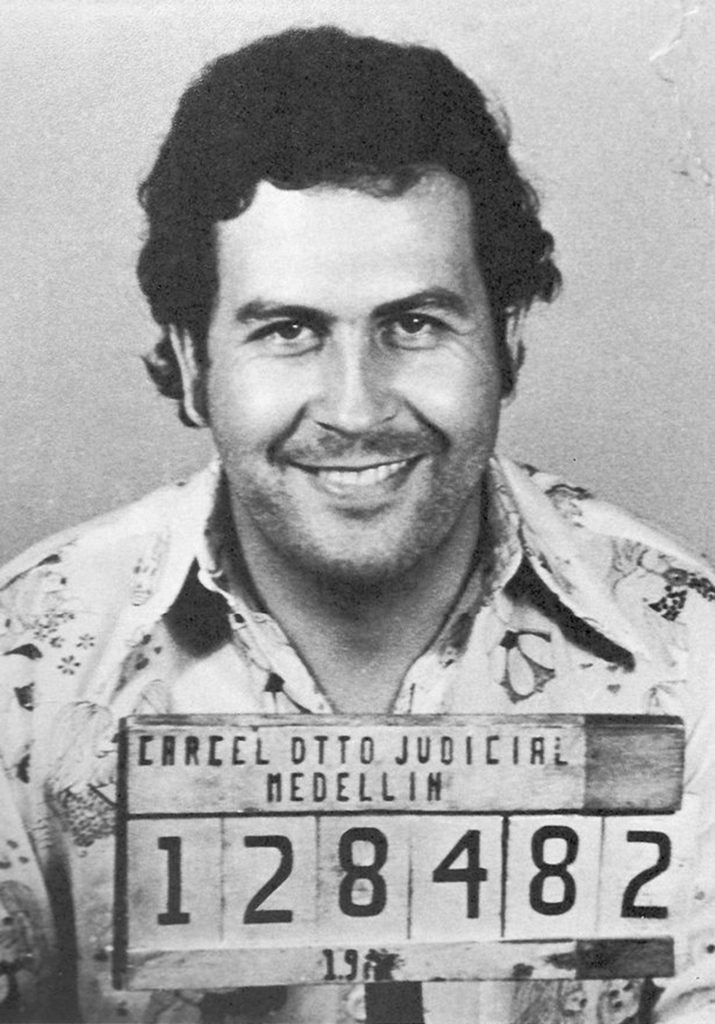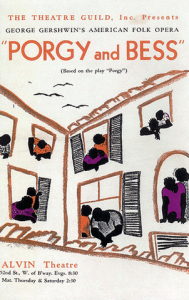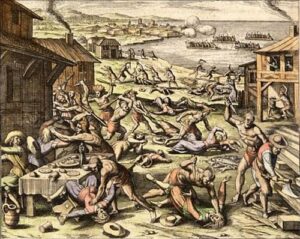
Pablo Emilio Escobar Gaviria was one of the most notorious villains of all time and is known as “The world’s greatest outlaw.” Escobar was born on December 1, 1949 in Rionegro, a small village close to Medellín, Columbia. He came from an extremely poor family; he and his brother Roberto were once sent home from school as they could not afford to buy any shoes. He briefly studied at Universidad Autónoma Latinoamericana but was forced to leave as he was unable to pay the fees required. This was the point when his criminal career began. He and his brother allegedly stole gravestones and sanded them down to be resold. He then moved into other crimes, such as street scams and stealing cars.
In the 1970s, Escobar was introduced to smuggling by Alvaro Prieto, who was a local smuggler with many connections. Escobar then began to distribute powder cocaine himself, meaning he would make more money for himself. Escobar also established the first smuggling routes into the United States in 1975. His infiltration into the drug market of the U.S. expanded exponentially due to the rising demand for cocaine in the U.S. By the 1980s, it was estimated that 70 to 80 tons of cocaine were being shipped from Colombia to the U.S. monthly. His rise continued when infamous Medellín drug dealer Fabio Restrepo was murdered and all his workers were told that they now worked for Escobar, making him the head of the Medellín Cartel, one of the largest drug cartels in history. As the demand for cocaine in the US grew, so did Escobar’s empire. Escobar and his brother were soon organizing distribution networks through Panama, Bahama, and South Florida, among other areas in the U.S.1

At the height of his criminal career, Escobar and his cartel controlled over 80 percent of the global cocaine market. Escobar was the wealthiest criminal in history, with an estimated known net worth of US $30 billion by the early 1990s (equivalent to about $55 billion as of 2016). During the height of its operations, the Medellín Cartel made more than 70 million U.S. dollars per day (roughly $26 billion in a year), smuggling 15 tons of cocaine per day, with a street value of over half a billion dollars, into the United States. The cartel spent over $1000 per week purchasing rubber bands just to hold stacks of cash together to store in their warehouses. Ten percent of this cash had to be written off each year because it would be eaten by rats.1
During his early life, Escobar learnt that police were open to bribes, but as he became more powerful, he developed his own policy: ‘plata o ploma,’ simply meaning ‘silver or lead.’ This policy led to the death of hundreds of policemen and state officials, which solidified Escobar’s reputation as a cold ruthless killer as well as a drug lord. Escobar apparently said, “better a grave in Columbia than a gringo jail.” Being extradited to the U.S. was his biggest fear. After multiple failed attempts to capture Escobar, the government offered a $400,000 reward for whoever killed him. This resulted in Escobar declaring war on the Columbian government. His wealth was enough to start this war, as he offered a reward to anyone who murdered a police officer. Over 600 officers were killed, making Columbia the murder capital of the world in 1991 and 1992.1
However, there is another side of Pablo Escobar that we often fail to hear about, as it is clouded by all the bad things he did. He was always willing to give back to the people of Columbia. Many people in Columbia still believe that Escobar did a lot more to better the lives of the poor and less privileged than the Colombian government ever did. Many poor people in Columbia felt neglected by the government, whereas when Escobar was alive they had someone to help them. Coming from a background of poverty himself, he knew how tough life was for the poor, and always shared his money and wealth with the community. Escobar made sure everyone in his community was taken care of. He provided work and shelter for those who needed jobs or residences. Even to this day, Escobar is referred to as “The Godfather” or “Robin Hood” by his people because of the invaluable contributions he made for the society. For example, he constructed numerous housing projects so that everyone at least had a place to live. He is also responsible for establishing and funding soccer teams and leagues in Colombia as well as building countless numbers of churches, hospitals, and schools across the country. He advocated education for the children.4
There are two completely different sides to the story of Pablo Escobar. Most people know the story of a ruthless, atrocious criminal that ruined and took the lives of countless numbers of innocent victims. On the other hand, by some, especially the working class in Columbia, he is thought of as a very respectable human being who made irreplaceable contributions and gave back freely to the community genuinely out of his good will to better the lives of the poor and less fortunate. A large amount of the working and lower class of Columbia are grateful to Escobar because of all the things he did for them. Escobar came from nothing and made something out of his life, and although what he did was illegal, he used a large portion of his proceeds towards good causes. Escobar wanted to make Columbia better and improve the quality of life for the people. Although he achieved this through criminal activity, he did achieve his goals. During the era of Escobar, Columbia’s quality of life was on the rise.5
However, the good things Escobar did do not make up for all the innocent lives that he ended. Some people think that the Columbian government is partially to blame for the deaths of the officers by putting so many on the front line to try to capture him. Escobar was so powerful that he had so many people willing to fight against the officers for him that many of the officers had no chance in a firefight against the cartel. It is a matter of opinion as to how people see Pablo Escobar. Most people see him as a major criminal; however, many people in Columbia still believe that Escobar used his wealth for good intentions.
- Global Events: Milestone Events Throughout History, 2014, s.v. “Pablo Escobar Dominates the International Cocaine Trade,” by Jennifer Stock. ↵
- Global Events: Milestone Events Throughout History, 2014, s.v. “Pablo Escobar Dominates the International Cocaine Trade,” by Jennifer Stock. ↵
- Global Events: Milestone Events Throughout History, 2014, s.v. “Pablo Escobar Dominates the International Cocaine Trade,” by Jennifer Stock. ↵
- Ron Chepesiuk, Escobar Versus Cali: The War of the Cartels (South Carolina: Rock Hill, 2013), 48-50. ↵
- Aldona Bialowas Pobutsky, “Peddling Pablo: Escobar’s Cultural Renaissance,” Hispania Vol. 96, No. 4 (December 2013): 684-699. ↵



70 comments
Elias Garza
When I was growing up I always thought Pablo Escobar was the same person as Alcides Escobar, the shortstop for the Kansas City Royals. But as I learn more about Pablo I am more intrigued about his life. The fact that he went from not going to school because he could not afford the fees to being a billionaire amuses me. Of course, if he could have done it in a legal way without hurting innocent people would have been great as well.
Maricela Guerra
I have heard of Escobar and how ruthless and dangerous he was. However I did not know he was that wealthy and how powerful he was with the lives of others. I still don’t understand how this many people worked for him and were proud to be. I would fear for my life if I would be working with someone as dangerous as him.
Saira Castellanos
I mean Pablo is kind of like Robin Hood, except for the part of the innocent lives being lost. I am from a border town, so the name Pablo Escobar is not something new to me. Their government is something that the people find as a joke, and in my opinion, it is a joke. He helped more people than the government. I think that he could have been a great businessman. I want to respect him for giving back to Columbia but its kind of hard to do considering all of the very illegal things he has done.
Lewis Wilson
I Have loved reading this article because been so interested in this lately because of all the Netflix series and movies coming out about him. Also gathering the information from this article the amount this man is worth is incredible for selling drugs. Also how he had everyone on his pay role and how many people he killed is also breath taking.
Bryan Martin Patino
this was an interesting article kinda a mixture of rise of a king type of story only that its mixed with the antics of the drug world. Pablo is now one of the most infamous know drug lord and he even got a Netflix show which made him only more famous among the common people. the whole story is interesting knowing that he started off doing regular petty crimes and doing small time stuff and then jumping straight to smuggling and then becoming the head of a cartel. it is horrifying to know that so many people had to do because they were doing their jobs.
Irene Astran
It is quite interesting that the working class and the government often had differing views of Pablo. Unlike other notorious dealers, he donated to fund several resources for the people of Colombia. It is apparent that he lacked respect for authority figures. At one point, he even ran for congress. It may have been that he wanted to run his own show rather than to respect the powers in office already.
Benjamin Arreguin
I enjoyed the article because how relevant the article is to the US still to this day. Escobar was and most likely is still one of the biggest names in cartel history, and what he was able to do with his power is astonishing based on where he comes from and how he came to his wealth and influence. What he contributed back to his country and roots is something respectable, and I can see why Columbians in that community respected him more than their own government. The bottom line was that he was leading the acts of illegal activity, but I liked how the article also showed the silver lining to the situation.
Grady Purcell
This article was very interesting to me because I always heard about how big Pablo Escobar was but I never believed he was this big until I read the article. Pablo had so many ties to everyone I think it is so crazy how money can buy you almost anything you want. He took this drug smuggling to a whole new level, he forever changed the face of the drug world by doing what he did.
Yahaira Martinez
Throught reading this comment, i was in shock to hear how much money Escobar made and how insanely rich he was. The article did an amazing job describing both sides of Escobar, the widely known one and the side that has been hidden, and not widely known. it was interesting to hear about all these unknown details of Escobar’s life, such as how he gave back to his community and how he was even considered a Robin Hood down in Colombia. Such an amazingly well written article.
Vanessa Tombo
This was a very insightful article, I learned so much about the cartel and more especially 10% of their money was eaten by rats. What a life, if I was given 10 percent of their money I would be rich enough to sponsor 100 students and more’s undergraduate education at St Mary’s university. This article was very well structured and easy to follow. The most petrifying part that I read was the number of innocent lives that were lost. Police officers and other people were killed while trying to do their jobs.